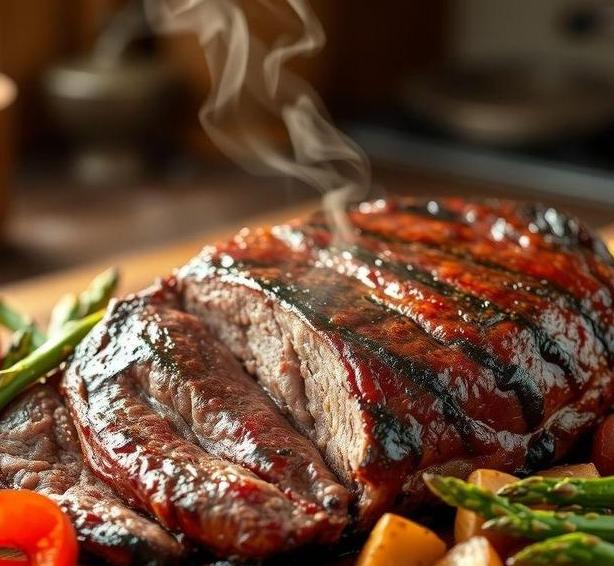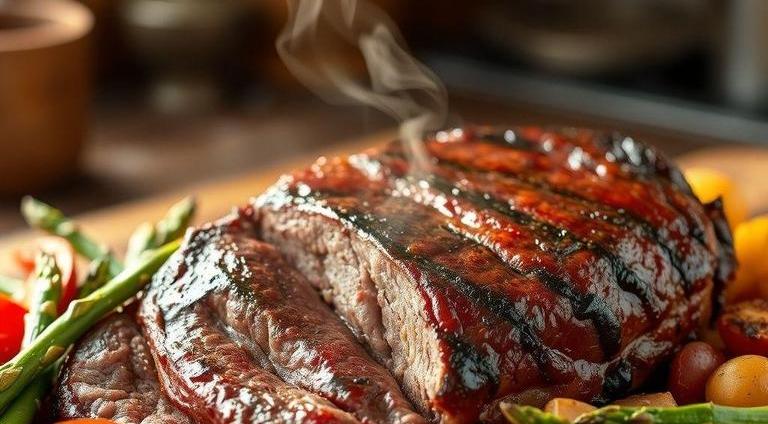Brisket is a hearty, flavorful cut of beef that’s slow-cooked to perfection, often turning into the centerpiece of a memorable meal. Whether it’s smoked, roasted, or braised, brisket holds a special place in many kitchens, and its rich flavor and tender texture make it a favorite at gatherings. But, like all good things, brisket doesn’t last forever. You might find yourself wondering how long cooked brisket stays safe to eat, or if it’s possible for it to go bad.
So, let’s talk about how long your cooked brisket lasts, how to store it properly, and how to recognize if it’s time to say goodbye to your meaty masterpiece. By the end of this, you’ll be armed with all the knowledge you need to enjoy your brisket leftovers without worry!
Can Cooked Brisket Go Bad?
Yes, absolutely! Cooked brisket, like any other cooked meat, can go bad over time. Although it might seem like it could last indefinitely with all that flavor locked in, it’s important to remember that bacteria and spoilage are always at play, even if the meat is cooked. Proper storage plays a huge role in how long it will stay safe to eat. The risk of spoilage increases the longer cooked brisket sits at room temperature or in less-than-ideal conditions.
Here’s why:
- Bacterial Growth: When brisket is left out at room temperature for too long, harmful bacteria, such as Salmonella or E. coli, can begin to multiply, leading to foodborne illnesses.
- Moisture and Air Exposure: If brisket isn’t properly sealed or covered, moisture loss and exposure to air can degrade the texture and flavor, making it less appetizing, if not unsafe.
- Oxidation: As the brisket sits in the fridge or freezer, the fats and proteins in the meat can begin to break down, contributing to spoilage and off-flavors.
So yes, it can go bad-but if you store it properly, you can extend its lifespan and enjoy your brisket for days or even weeks, depending on your storage method!
Shelf Life For Cooked Brisket

The shelf life of cooked brisket depends heavily on how it’s stored, but here’s a general idea of how long you can expect it to last in different environments:
- In the Fridge: If you’ve cooked your brisket and want to keep it fresh for a few days, the fridge is your best bet. Wrapped tightly in foil, plastic wrap, or stored in an airtight container, cooked brisket will typically last for 3 to 4 days.
- In the Freezer: Freezing is the way to go if you’re looking to store your cooked brisket for a long period of time. If wrapped properly (double-wrapped in plastic or foil, or stored in a freezer-safe container or vacuum-sealed bag), cooked brisket can last up to 2 to 3 months in the freezer.
- At Room Temperature: If you leave your brisket at room temperature for more than 2 hours, you’re at risk for bacterial growth, which can spoil the meat. During warmer months or in warmer environments, that window shrinks even further to 1 hour. After that, it’s best to toss it to avoid potential foodborne illness.
Common Signs Of Spoilage
Knowing when your cooked brisket has gone bad is crucial in avoiding the disappointment (and potential stomach ache) of consuming spoiled food. Here’s how to tell if your brisket has seen better days:
- Smell: One of the first indicators of spoilage is the smell. Fresh brisket, whether cooked or raw, has a savory, meaty aroma. If the meat gives off a sour, rancid, or off-putting odor, that’s a clear sign it has spoiled.
- Color Changes: Freshly cooked brisket should have a deep brown or reddish hue, depending on how it was cooked. If it starts turning grey, greenish, or has an overall discolored appearance, it’s no longer safe to eat. A slight color change can occur naturally as it cools, but drastic shifts are a red flag.
- Slimy Texture: When cooked brisket becomes slimy or sticky to the touch, it’s a sign that bacteria or mold has begun to grow. This texture is not something you should ignore-it’s time to toss it.
- Mold: If you see any fuzzy green, blue, or white spots growing on the surface of your brisket, that’s a clear sign of mold. Mold can develop even in the fridge if the brisket isn’t properly sealed.
- Off-Taste: If your brisket smells and looks okay but tastes a little off, you should err on the side of caution and dispose of it. The taste will often be the last indicator of spoilage, and if you’re questioning it at all, don’t risk it.
How To Store Cooked Brisket?

Proper storage is key to extending the life of your cooked brisket. Here are some essential tips for keeping your brisket fresh:
- Cool It Down Quickly: After cooking, let your brisket cool down to room temperature for no more than 2 hours (or 1 hour if the temperature is above 90°F). The faster you cool it, the less likely bacteria will have time to grow. If you plan on storing a large amount, you can cut the brisket into smaller portions to help it cool down more quickly.
- Wrap It Up: Once it’s cooled down, wrap the brisket tightly in plastic wrap, aluminum foil, or place it in an airtight container. If you plan on freezing it, make sure it’s wrapped in freezer-safe plastic wrap or a vacuum-sealed bag to prevent freezer burn.
- Use Airtight Containers for Fridge Storage: For refrigerator storage, airtight containers are ideal, as they prevent moisture loss and exposure to air, which can lead to spoilage. Plastic containers with tight-fitting lids are your best bet.
- Label & Date: If you’re storing brisket in the fridge or freezer, make sure to label it with the date it was cooked. This helps keep track of how long it’s been stored and ensures you don’t forget about it. Use the 3-4 day fridge guideline or the 2-3 month freezer guideline to stay on top of things.
- Freezing Options: If you plan on freezing your brisket, you can also freeze it in smaller portions. This makes it easier to reheat just the amount you need, and helps avoid repeatedly thawing and refreezing, which can degrade the quality.
Expert Tips
Want to make sure you get the most out of your brisket? Here are some pro tips from chefs and food safety experts:
- Use a Meat Thermometer: Before storing any cooked meat, make sure it has reached an internal temperature of 145°F (for brisket, it’s usually higher during cooking). This ensures that it’s cooked thoroughly, making it less likely to go bad quickly.
- Avoid Overcooking: While brisket benefits from long, slow cooking, be mindful of overcooking it. When reheating, you want to preserve its tenderness and moisture. A low-and-slow reheat in the oven or on the stove can help keep your brisket juicy, but high heat can dry it out.
- Vacuum Seal for the Long Haul: If you want to extend your brisket’s lifespan in the freezer, invest in a vacuum sealer. Vacuum-sealed brisket can last months without the risk of freezer burn, and it helps maintain the quality of the meat.
- Reheat Properly: To bring your leftover brisket back to life, reheat it in the oven at a low temperature (about 300°F) to ensure it stays moist. You can add a little beef broth to keep it juicy. Avoid microwaving for long periods, as it can make the meat tough and dry.
FAQs
How Long Can Cooked Brisket Last In The Refrigerator?
Cooked brisket can last in the refrigerator for 3 to 4 days when stored properly in an airtight container. It’s important to refrigerate it within two hours of cooking to prevent bacteria growth.
Can Cooked Brisket Be Frozen?
Yes, cooked brisket can be frozen for up to 2 to 3 months. For best results, wrap it tightly in plastic wrap or aluminum foil, then place it in an airtight freezer-safe container or freezer bag.
What Are The Signs That Cooked Brisket Has Gone Bad?
Signs that cooked brisket has gone bad include a sour smell, discoloration (especially a greyish or greenish hue), slimy texture, or an off-taste when consumed. If any of these are present, it should be discarded.
How Can I Tell If My Brisket Has Been Stored Improperly?
If your brisket has been stored improperly, it may show signs like mold growth, an unpleasant odor, or a noticeable change in texture. Make sure it’s refrigerated promptly and kept in a sealed container to prevent bacterial contamination.
Can Cooked Brisket Be Left Out Overnight?
No, cooked brisket should not be left out overnight. Bacteria can multiply rapidly when food is left in the temperature danger zone (40°F – 140°F) for more than 2 hours, making it unsafe to eat.
How Can I Extend The Shelf Life Of Cooked Brisket?
To extend the shelf life of cooked brisket, refrigerate it within 2 hours of cooking, store it in an airtight container, and consume it within 3 to 4 days. If freezing, wrap it tightly and store it for up to 2 to 3 months.
Can You Reheat Cooked Brisket After It Has Been Frozen?
Yes, you can reheat cooked brisket after it has been frozen. Thaw it in the refrigerator for 24 hours, then reheat it in the oven, microwave, or on the stovetop until it reaches an internal temperature of 165°F.
Is It Safe To Eat Cooked Brisket That Has Been Refrigerated For A Week?
No, it is not recommended to eat cooked brisket that has been stored in the refrigerator for a week. The USDA advises consuming refrigerated leftovers within 3 to 4 days for safety reasons.
Can Cooked Brisket Go Bad Even If It Smells Okay?
Yes, cooked brisket can go bad even if it smells okay. While a foul odor is a common sign of spoilage, changes in texture, color, or flavor can also indicate the meat has spoiled, even if it doesn’t smell off.
How Should Cooked Brisket Be Stored To Prevent It From Going Bad?
Cooked brisket should be stored in an airtight container or tightly wrapped in plastic wrap and aluminum foil. Ensure it is cooled to room temperature within 2 hours of cooking before refrigerating or freezing it to prevent bacterial growth.